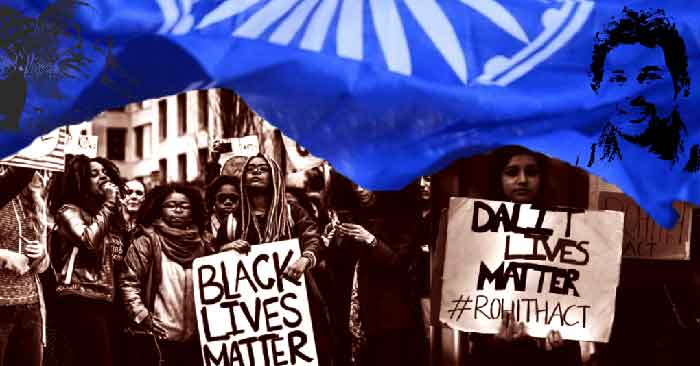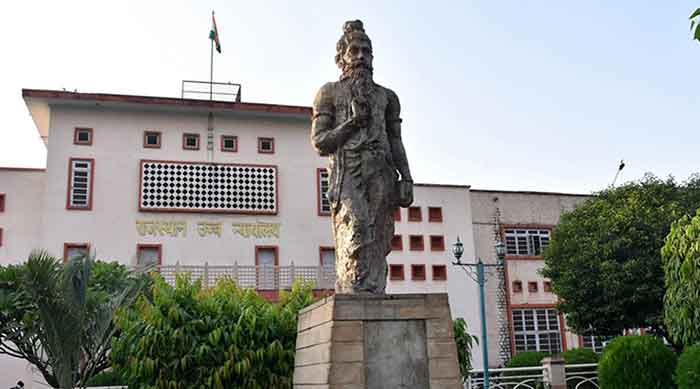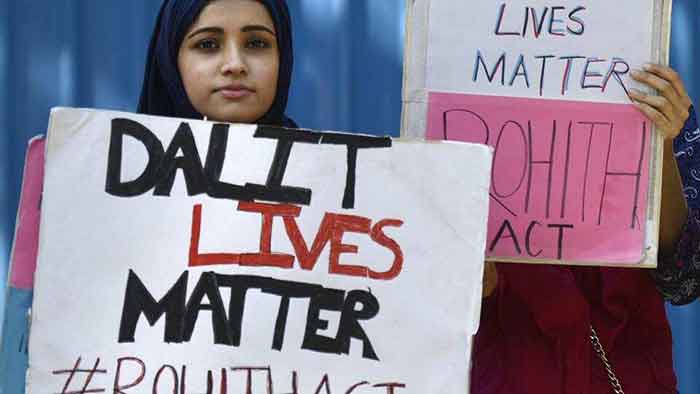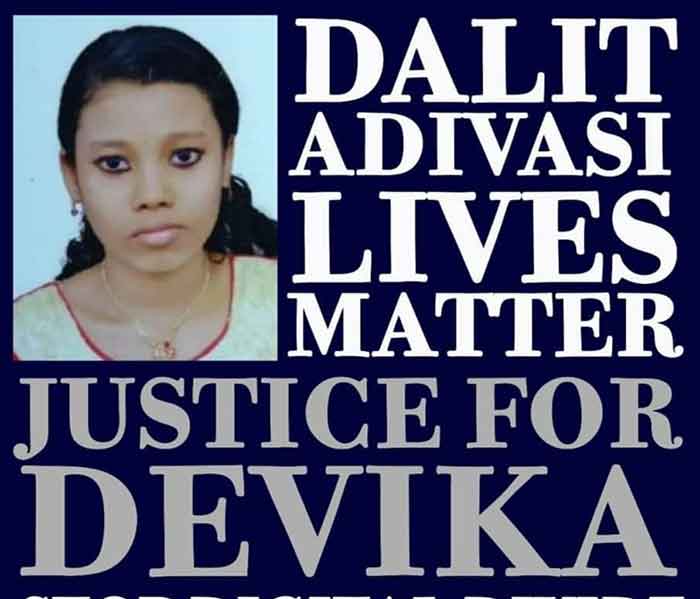
A storm has risen in America and Europe. Under the influence of that storm, we, in India, are experiencing a gentle breeze. An African-American man named George Floyd had been a victim of racism in the United States, and the storm of protest is due to his death in police custody. In India, people on social media are once again vocal against racial discrimination.Though on-road protests are not being held now in India due to the lockdown, thousands of people in America and Europe have joined protest marches ignoring the threat of coronavirus infection. Well, is there any difference between the three forms of anti-social violence, namely racism, caste discrimination, or communalism? And if there is no such difference, then why shouldn’t we be vocal in our protest by stitching together pictures of SamruMadkami, a Dalit Christian teenager from Kendugura village in Malkangiri district of Orissa, and George Floyd? Religious fanatics had brutally murdered Samru, who was in class seven, while two other Christian boys could escape. His offence was that, three years ago, the whole family had converted to Christianity. Orwe can talk about that young man from Pune, Maharashtra.Viraj Vilas Jagtap, a 20-year-old Dalit youth from Pune’s Pimple Saudagar area, was brutally beaten and murdered on 7th June by the family members of the upper-caste girl with whom Viraj was having an affair.
Though the nationwide lockdown in the name of preventing coronavirus infection is still in place, the brutal oppression of innocent people by the fundamentalists based on religion or casteism is continuing unabated. Is there any fundamental difference between racism in Europe or America and caste-based atrocities carried out in India? On the one hand, globally-acclaimed leaders like Martin Luther King, Jr. and Nelson Mandela were awarded the Nobel Peace Prize. On the other side, the black people, who are the successors of these revered leaders, are discriminated based on their skin colour. Similarly, in India,there has been a big struggle between the ruling party and the opposition over who respects BabasahebBhimraoAmbedkar, the framer of the country’s constitution, more. At the same time, every day, somewhere or other in India, Dalits or so-called lower castes are being attacked or killed even though BabasahebBhimraoAmbedkar is a near and dear one and an idol of the Dalits. All over the world, not only the face of exploitation, oppression and repression are the same, but there is also a similarity in the contradiction existing between public speeches and actions. However, a difference also exists between the incidences in the USA and that in India. This difference lies in the response expressed by society.
Though the killing of George Floyd in distant America pains us to a great extent, we remain indifferent to the murder of SamruMadakami in Orissa by an equal scale. Protests over Samru’s killing continues to be confined within Christian organizations. On 6th June, a 17-year-old Dalit youth Vikas Kumar Jatavwas killed in Amroha, Uttar Pradesh by the upper-caste villagers because he had entered a temple ignoring the objections and warnings of the upper caste men. In the southern state of Tamil Nadu, incidences of the attack on Dalits have increased during the lockdown imposed due to coronavirus. Since the lockdown began on 25thMarch, there have been 30 incidents of caste-related violence in the 47 days till10thMay. In almost all these cases, the upper castes have used the lockdown as an opportunity to attack the Dalits. M Sudhakar, a 24-year-old youth belonging to the Most Backward Caste (MBC), was killed by his in-laws on 29th March in MorappanThangal village near Arani town in Tiruvannamalai district. His offence was that he was in love with and had married a girl from the same MBC group but whose caste is higher than that of Sudhakar. On 8th May, in the village of UdayarkulamnearTuticorin, A. Palavsam and his son-in-law R. Thangaraj were killed by an upper-caste group. On the same day, upper-caste people killed a Dalit named Vishnupriyan in Salem. Even in this epidemic, casteism has not paused even for a minute. Inhumane treatment of Dalit workers, who have returned to their villages from other places owing to lockdown, by the upper castes has become commonplace incidence. It shows once again that there is no set time for caste discrimination.
There is no shortage of law against caste-based discrimination in India. There are many provisions in the law to punish caste-supremacist criminals. But in most cases, the administrative procrastinations in punishing the upper castes are inspired by the ruling parties. In the backdrop of corona-pandemic, the entire world is under lockdown, but this has not thwarted any discrimination. The idea of discrimination everywhere in the world, whether based on racism or casteism, is more deadly than the coronavirus. That is why the age-old racist discrimination, caste division and discrimination, oppression of Dalits is a hard reality even in the 21st century all over the world. In 1609, all Muslims in Spain were ordered to leave the country within three days, failing which there was a threat of extermination. More than 3,00,000 Muslims had to flee Spain, quitting villages and cities inhabited by them for generations. The Spanish incident is one of the worst examples of large-scale genocide and mass displacement in the history of Europe. Today, the Hindutvavadis or fundamentalist majoritarians are attempting to enact a similar such move in India.
I had started the discussion on the murder of George Floyd and the massive protests in America and Europe that followed. In that context, oppression of Dalits and attacks on religious minorities have come up due to their similarity with racial discrimination. I shall end this discussion with the symbolic form of our response to this social injustice or violence. Two days ago, I saw a comment on the social media inquiring whether the news of George Floyd’s death was published in the Indian media or not. I was surprised. I believe in internationalism. But this does not mean that while we focus on the death of George Floyd, we will put the murder of SamruMadkami or Phanidhar Borah (who was beaten to death by the police in Assam) on the backburner. We have to join the protest against the murder of George Floyd keeping the names of the deceased in India in the front. We have to launch protest movements against the killings of people SamruMadkami, Phanidhar Borah, Tabrez Ansari (who was beaten to death in Jharkhand by the fundamentalists from the majority religious group on false charges) as a part of the solidarity movement against the killing of Flyod. Also, this is a constant battle.
Thanks to the news and social media, the majority of people in India came to know the name of George Floyd. Then again, most of the Indians are not aware of the death of Phanidhar Borah, due to the role played by the media. In a pre-primary English textbook in West Bengal, while presenting the alphabets with corresponding words and images, the book says U is for “Ugly”. Along with it, a picture of the face of a black man has been given. Next to the photo, it has also been mentioned in Bengali. A heated debate has started in the district of Burdwan over the expression of ‘ugly’ and vulgar display of ‘racist’ mentality in children’s textbooks. The parents have demanded immediate cancellation of the textbook from the pre-primary department of the government-aided schools in the district. They think that this teaching to the children, which spreads racial discrimination, is not a part of proper education. Here are two lines published in a newspaper about why this debate and protest took place …………..“A few days ago, a black man named George Floyd has become a victim of racism in the United States. Protests erupted around the world over his death in police custody. Not only that, but people have also raised questions about the violent manner in which he was killed in public. The incident of that death in the United States has touched the minds of the people of Bengal.” If the murder of George Floyd were not publicized widely,the image of a black man to denote the word ‘ugly’ would have continued in the textbook. In this situation, it is the responsibility of every democratic person to organize a continuous movement to change the mentality and the situation that give rise to discrimination. Only by organizing protests against every incident of discrimination, every occurrence of death in the police custody, we will be able to stop the death procession of SamruMadkami, Phanidhar Borah, Tabrez Ansari and George Floyd in future.
Asish Gupta is a senior journalist
SIGN UP FOR COUNTERCURRENTS DAILY NEWSLETTER












































